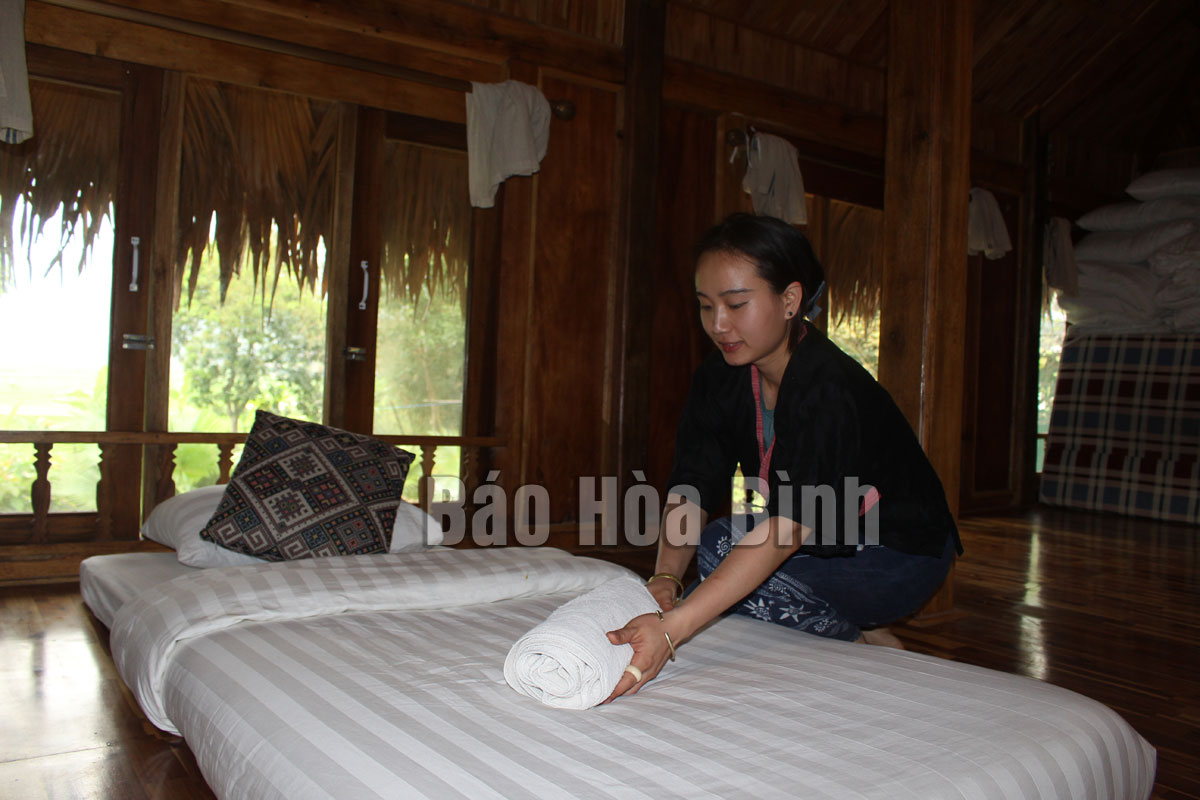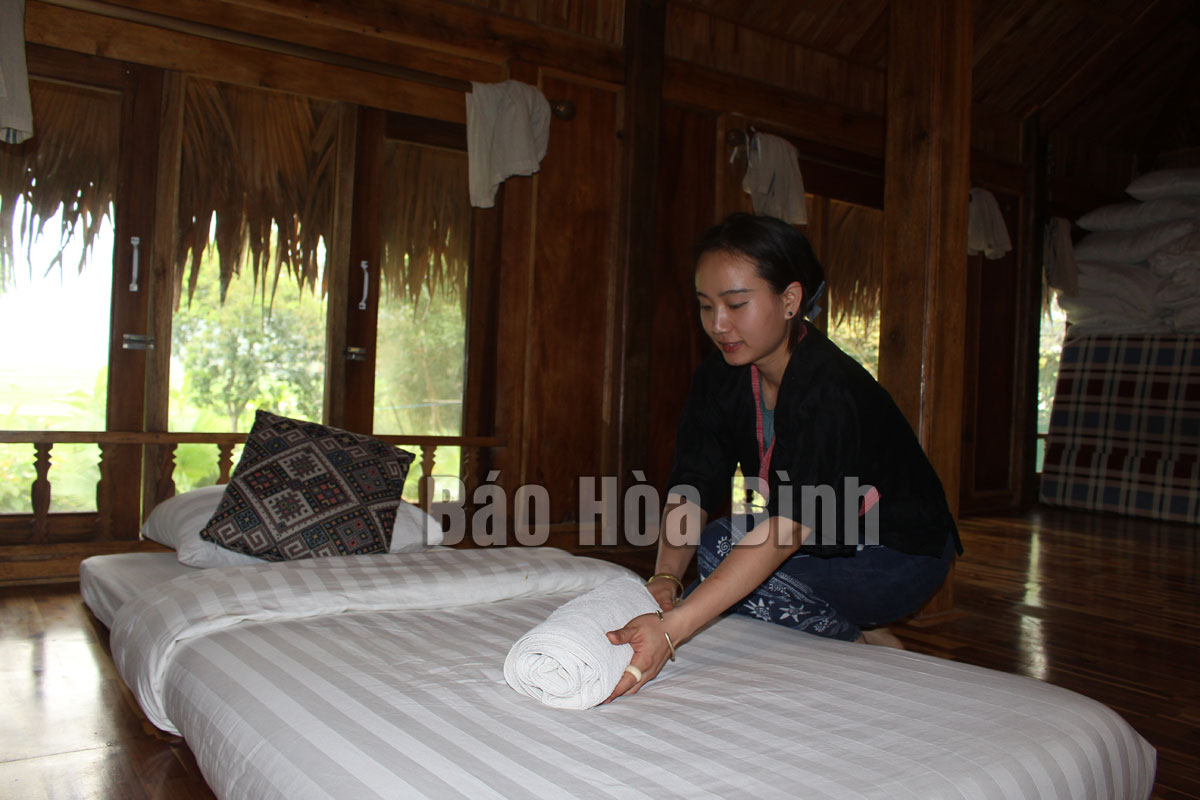
(HBO) - In the past time, rural tourism in Hoa Binh province has developed rapidly with many unique models attracting tourists such as experiencing orange gardens, tea hills or exploring natural reserve centres, craft villages and local culture at community-based tourism sites.
Developing
rural tourism has contributed to raising local residents's incomes. It is a
fundamental solution and a driving force to promote new-style rural area
building in a sustainable way.
Households engaged in community-based tourism in Lac village, Chieng Chau
commune (Mai Chau District) pay attention to improving tourism skills.
The province has potential to develop rural tourism, considering the richness
and diversity of local cultures and lifetyle of the Muong, Thai, Tay, Dao and
Mong ethnic groups that are preserved in each village.Natural
landscapes and unique ecosystems in nature reserve centres are also an
advantage.
Hoa Binh has set up concentrated agricultural areas towards organic production
and VietGAP standard such as fruit growing areas in Cao Phong, Tan Lac, Kim
Boi, Lac Thuy; and safe vegetable production areas in Luong Son district.
With such potential and advantages, the province will focus on developing
various types of rural tourism, mainly agricultural, community-based and
ecological tourism.
In addition to the rapid development of community-based tourism, in recent
years, some localities are paying attention to develop agri-tourism, with Cao
Phong district a typical example. From 2016, the district began welcoming
tourists to local orange gardens. The friendliness and hospitality of the
gardeners along with the beauty of ripe orange orchards have attracted a large
number of visitors.
Dinh Cong Su, Vice Chairman of the provincial People's Committee emphasized
that the tourism industry, with the typical imprint of each region and each
ethnic group, have gradually met the needs of visitors who want to visit and
gain new experiences. As a result, the landscape, environment, cultural and
spiritual life of rural areas have changed significantly, becoming liveable
rural areas.
Rural tourism has created jobs for local people, promoted the consumption of
agricultural products, especially those under the One Commune One Product
model, he said.
It has raised the capacity, knowledge and awareness of rural people while
helping preserve traditional cultural identities.
In the coming time, in order to create a connection between tourism,
agriculture and rural areas towards forming a highly competitive production
value chain, and improving local living conditions, it is necessary for
agencies and localities to coordinate to enhance their responsibilities in
State management of community-based tourism.
Special attention should be paid to areas where ethnic minority people reside.
It is essential to implement a master plan on community-based tourism
development and more investment should be poured in infrastructure.
There should be a close connection between community-based tourism and
agricultural tourism
The development of community-based tourism should be associated with
agri-tourism, craft village tourism and learning about OCOP products in each
locality.
A diverse chain of eco-tourism and resort destinations concentrated in Hoa Binh city and the districts of Tan Lac, Da Bac, and Luong Son… Along with the launch of several key high-quality resort tourism projects, these developments have reshaped the landscape and enhanced the appeal of Hoa Binh as a travel destination.
Boasting diverse terrain, a mild climate, and rich natural resources, Cao Phong district is increasingly asserting its place on Vietnam’s tourism map, attracting both domestic and foreign visitors. The district is renowned for its stunning landscapes, majestic mountains, a crystal-clear hydropower lake, and the unique cultural identity of local ethnic groups.
With its pristine landscapes, unique cultural heritage of Muong ethnic minority, and an expanding range of visitor experiences, Tan Lac district of Hoa Binh has fast become a captivating destination for both domestic and international tourists.
Until now, Sung village in Cao Son commune, Da Bac district remains the only Dao ethnic community in Hoa Binh province to develop a community-based tourism model. Beyond its untouched natural landscapes, cultural identity serves as the cornerstone attraction for visitors.
Alongside the diverse cultural identities of the Kinh, Muong, Tay, Thai, Dao, and Mong ethnic people, Hoa Binh province is also renowned as the "capital" of the northwestern Vietnamese cuisine, offering unique and distinctive dishes. At festivals, during Lunar New Year (Tet), or on significant family or community occasions, special dishes are prepared, leaving a lasting impression on visitors.
A Phong Linh (Yellow Tabebuia) flower garden in Thang village, Thach Yen commune, Cao Phong district is currently in full bloom, drawing a large number of visitors.



